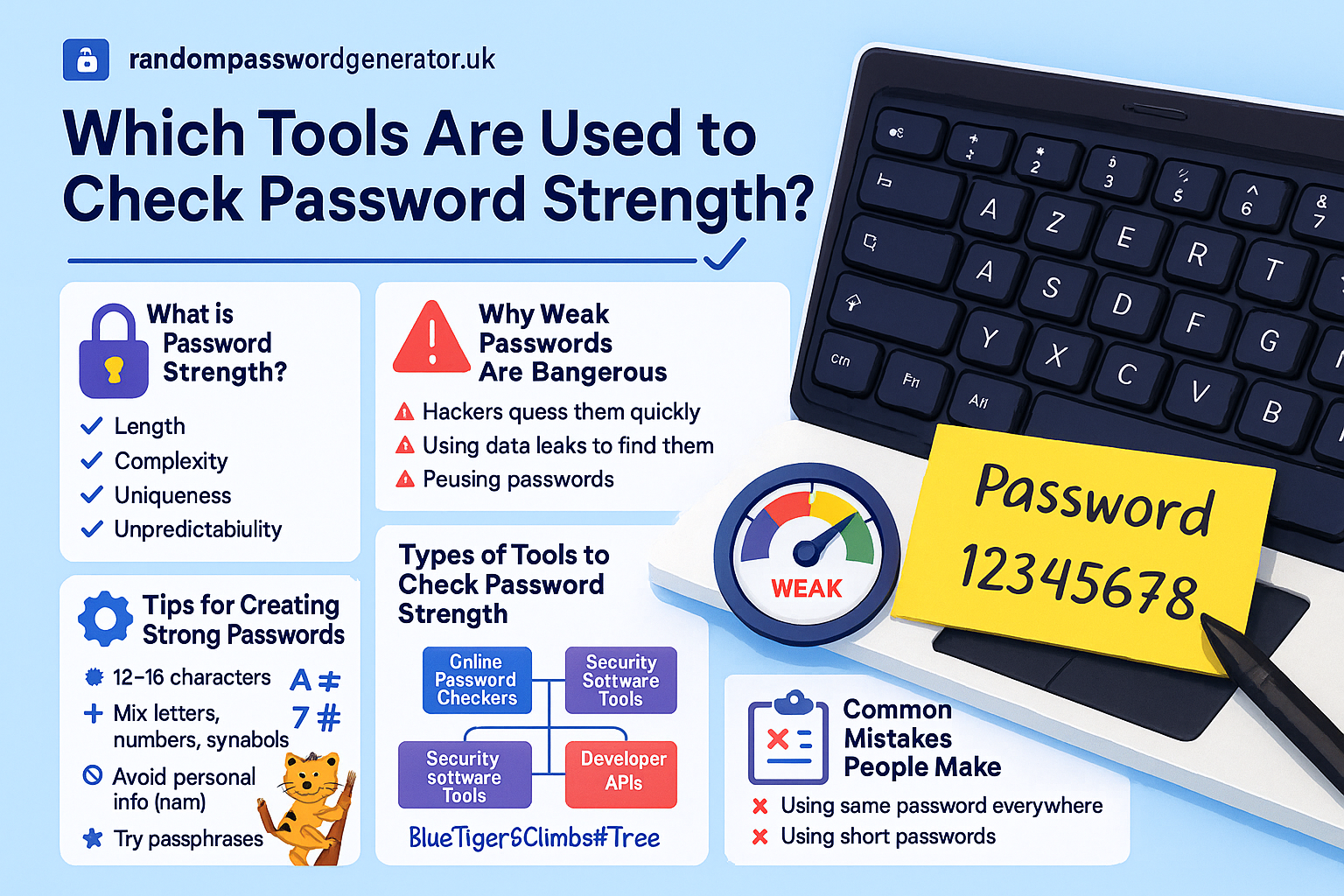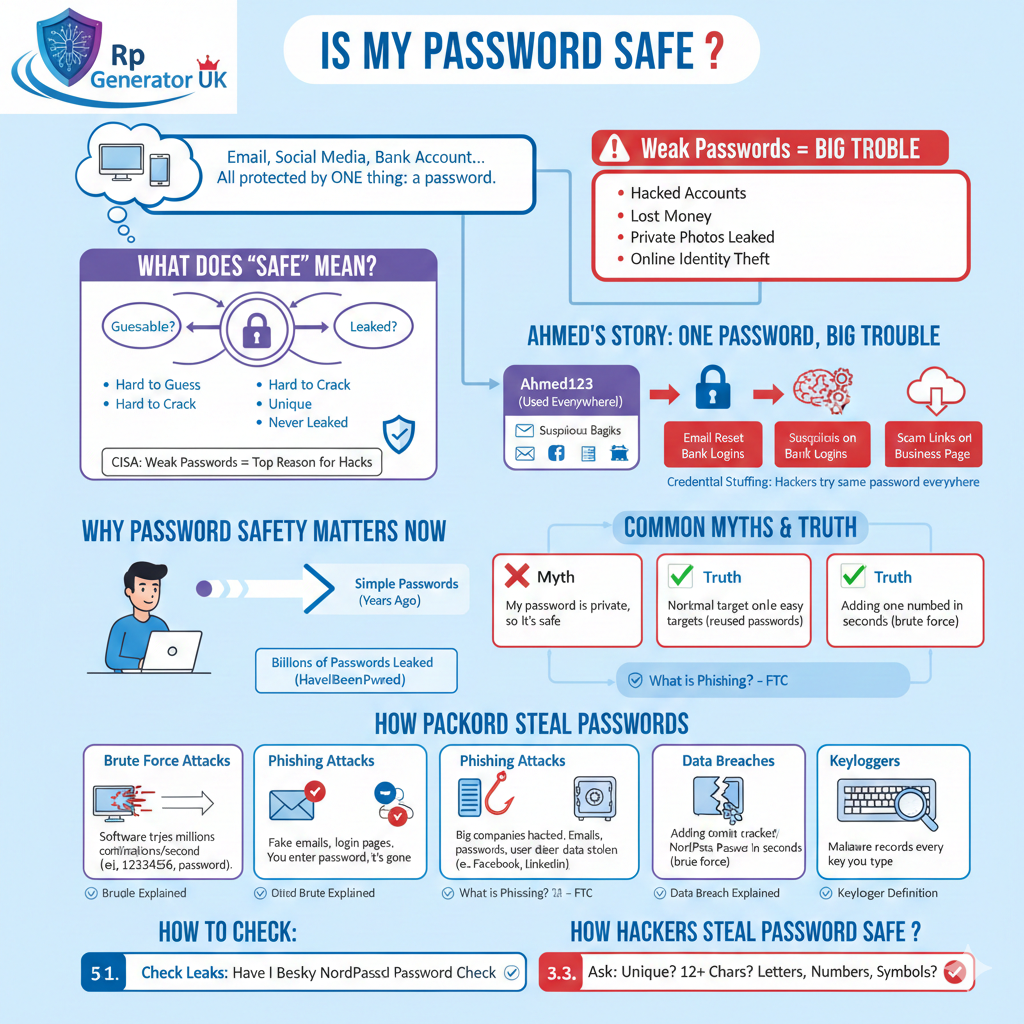Introduction – Why Password Strength Matters
Imagine this: You wake up, open your email, and see dozens of security alerts. Someone has logged into your social media, sent weird messages to your friends, and even tried to access your bank account.
How did this happen? The answer is simple: your password wasn’t strong enough.
Weak passwords are like leaving your house door unlocked. They make it easy for hackers to walk in and take whatever they want.
That’s why checking your password strength is one of the smartest things you can do for your online safety.
In this guide, we’ll break down:
- What does password strength mean
- Why it’s important
- Which tools can you use to check it
- How to create strong passwords that you can still remember
Tips, mistakes to avoid, and future trends in password security
We’ll keep everything easy to understand, no complicated tech talk.
1. What is Password Strength?
Password strength is basically how hard it would be for someone (or a computer) to guess your password.
A strong password is like a tough lock on your door; it’s hard to break in. A weak password is like using a cheap lock that can be opened with a paperclip.
The strength of a password depends on:
- Length – Longer passwords are harder to crack
- Complexity – A mix of letters, numbers, and symbols makes it stronger
- Uniqueness – A password that’s not used anywhere else
- Unpredictability – No common words, dates, or patterns
Example:
- Weak password: `123456` or `password`
- Strong password: `T!gr0n@S!un2025#`
2. Why Weak Passwords Are Dangerous
Weak passwords can cause serious problems:
Hackers can guess them quickly using software
They can use data leaks to find them
If you reuse the same password, one breach can give them access to all your accounts
Example Story:
Sarah used the same password, `mydog123`, for her email, Facebook, and online shopping. One website got hacked, and her password was stolen. Within days, hackers got into all her accounts, even her PayPal, because she reused the same password everywhere.
3. How Password Strength Is Measured?
Most password strength checkers use a few main methods:
Length Analysis – How many characters?
Character Variety – Does it use uppercase, lowercase, numbers, symbols?
Dictionary Check – Does it match common passwords or words?
Pattern Detection – Is it something predictable like `qwerty` or `abc123`?
Entropy Calculation – A mathematical formula that measures how random the password is
4. Types of Tools to Check Password Strength
Here are the main types of tools you can use:
A. Online Password Checkers
These are websites where you type in a password (sometimes safely, sometimes not be careful). They instantly tell you if your password is strong or weak.
B. Built-In Browser Tools
Browsers like Google Chrome, Safari, and Firefox have built-in password checkers that warn you if a password is weak or already leaked.
C. Security Software Tools
Antivirus programs like Kaspersky and Norton often include a password strength test.
D. Open-Source Tools
Developers often use open-source tools like zxcvbn to measure password strength inside apps and websites.
E. Developer APIs
Some companies offer APIs (like Have I Been Pwned) that let websites check if a password has been exposed in a data breach.
5. Popular Tools to Check Password Strength
Here are some trusted tools you can use:
1. Have I Been Pwned – Checks if your password has been leaked before
2. Kaspersky Password Checker – Rates your password and shows crack time
3. LastPass Password Checker – Tests strength and suggests improvements
4. 1Password Password Generator – Creates and checks strong passwords
5. Bitwarden Strength Meter – Free tool inside the password manager
6. Dashlane Password Strength Test – Gives a clear strength rating
7. Google Chrome Password Checkup – Built into Chrome browser
8. NordPass Password Strength Checker – Online tool with instant results
9. Zxcvbn by Dropbox – Used by developers for accurate checks
10. Microsoft Security Tool – Included in Microsoft accounts
6. Step-by-Step: How to Use These Tools Safely
1. Choose a trusted site – Only use well-known services
2. Avoid typing real passwords online – Test a similar password
3. Check for HTTPS – Website should be secure
4. Look for privacy info – Make sure they don’t store your password
5. Read the results carefully – They’ll tell you if you need changes
7. Tips for Creating Strong Passwords
Use at least 12–16 characters. Mix uppercase, lowercase, numbers, and symbols
Avoid personal info like names or birthdays
Try passphrases (e.g., “BlueTiger\$Climbs#Tree”)
Use a password manager to store them safely
8. Common Mistakes People Make
- Using the same password everywhere
- Using short passwords
- Including personal info (name, phone, birthdate)
- Thinking small changes like `password1` make it safe
- Ignoring breach alerts
9. Password Managers – The All-in-One Solution
Password managers like LastPass, 1Password, Bitwarden, and Dashlane can:
- Generate strong passwords
- Store them securely
- Autofill them when needed
- Warn you if a password is weak or leaked
10. The Future of Password Security
- Passkeys – Replace passwords with secure digital keys
- Biometrics – Use your fingerprint or face instead of typing passwords
- AI-based Security – Detect unusual login activity automatically
Conclusion:
Checking your password strength isn’t just a tech thing it’s a basic step for protecting your online life.
With so many free tools available, there’s no reason to keep weak passwords.
Make them long, unique, and unpredictable — and check them regularly.
Your future self will thank you.
FAQS:
1. What is a password strength checker?
A password strength checker is a tool that quickly shows you how strong or weak your password is. It checks things like length, randomness, and guessing time. The Bitwarden Password Strength Tester shows how long it might take someone to crack your password based on those tests.
2. Why does password strength matter?
If your password is weak or reused, hackers can break into all your accounts. A checker helps you see which passwords are risky so you can make them safer.
3. How do password checkers work?
They look at your password’s length, variety of characters, and randomness. Some even estimate how long it would take to crack. Bitwarden’s tool uses all these tests in seconds.
4. How long should a strong password be?
Experts say at least 14 characters. Better yet, 16 or more characters makes it much harder to crack.
5. Is longer always better?
Yes. Longer passwords are much harder to crack. Sometimes websites limit the length, but aim for as long as allowed.
6. What if a password were in a data breach?
Running a Vault Health Report in a manager like Bitwarden shows if a password was leaked and needs changing.
7. Should I change passwords often?
Not necessarily. Changing passwords all the time can make you pick weaker ones. Instead, only change a password if it’s been breached or is weak.
8. Do password checkers help users choose better passwords?
Yes. Showing strength as “weak,” “fair,” or “strong” helps people pick stronger passwords. Research shows visual feedback encourages better choices.
9. What makes a password strong?
A strong password is long, unique, and random. Avoid names, dates, or repeated patterns. Mixing characters helps, but unpredictability matters most.
10. What’s entropy in passwords?
Entropy is a computer’s way to measure how unpredictable a password is. Higher entropy means the password is harder to guess.
11. What is a passphrase?
A passphrase is a string of random words or a sentence that you can remember. It’s long and easy to recall, while still being secure. For example, “checkers-sailboat-lollipop.”
12. How can I test passwords safely?
Use trusted checkers like Bitwarden’s tester. They do the work on your device and don’t send your password over the internet.
13. Can password managers help?
Yes. A manager stores strong passwords, fills forms, and checks your vault for weak or reused passwords. It makes security easy.
14. How much harder is a long password?
Very much. An 8-character password may take minutes to crack, but a 16-character one can take years or even centuries to break.
15. Should I use special characters and numbers?
They help, but not as much as length and unpredictability. Random placement of symbols makes a password much stronger than predictable patterns.



